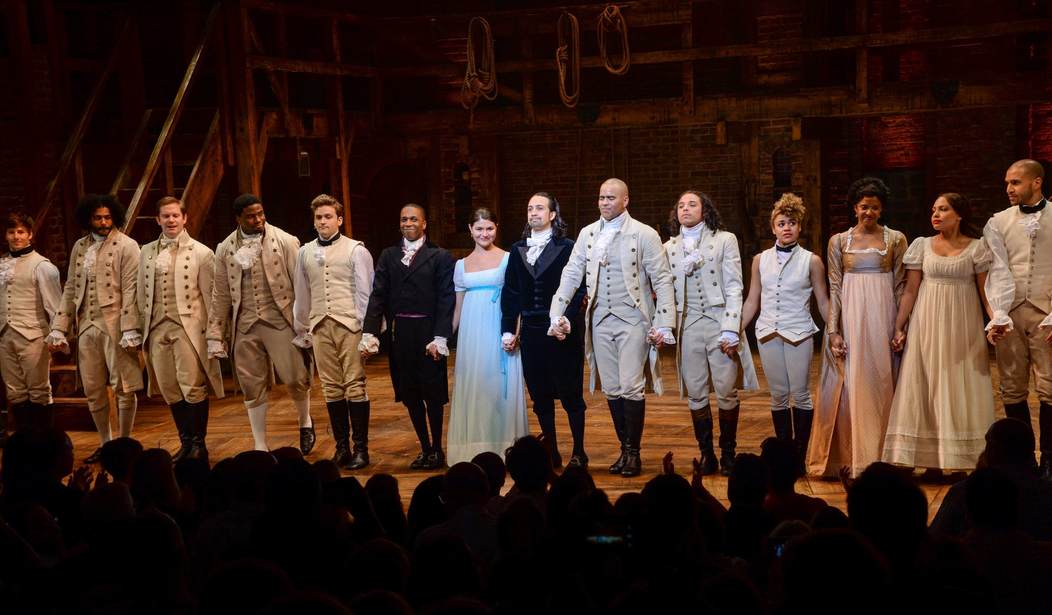Generations ago, audience members would frequently attend the theatre while armed with assorted rotten fruits and vegetables. The produce was reserved for cast members (or entire casts) who were especially inept. In fact, the well-known phrase “break a leg” is directly connected to the pelting of actors with rotten tomatoes. Prior to the twentieth century, the plane of the leg was “broken” when taking a bow; telling an actor to “break a leg” these days means that a well-wisher hopes the actor earns a curtain call and not a melon to the head. Last week, the Hamilton cast did not earn their curtain call.
As is well known, Vice President-elect Mike Pence attended a performance of the much ballyhooed Hamilton. While there, those able to afford the several-hundred-dollar ticket prices rewarded Pence with boos. Upping the ante, the cast delivered a sermonette to the country’s vice president-elect. Whether or not you agree with the sermonette, the cast of Hamilton deserves boos for the impromptu performance.
Please forgive me for getting a little theatre geeky for the next paragraph or three, but the cast of Hamilton did the theatre a disservice that night. Assuming the definitions and concepts of the great theatre artist Peter Brook, the cast took a nose dive into the “Deadly Theatre.”
In his seminal theatre theory book, The Empty Space, Brook wrote, “The theatre has often been called a whore, meaning its art is impure, but today this is true in another sense—whores take the money and then go short on the pleasure.” Brook goes on to explain that the hollowness of much of what passes for theatre is the result of theatre artists failing to recognize theatre’s purpose.
Throughout its long history, theatre has served societies in a variety of culturally specific ways. But all of those ways are rooted in the simplicity of an actor on a stage telling a story to an audience. Theatre is communication through the storytelling of actors. The specific forms and approaches to the communication of the story must all serve the story, not the other way around. This is why Peter Brook claimed that theatre artists who create deadly theatre are crippled by the fear that, “If you just let a play speak, it may not make a sound. If what you want is for the play to be heard, then you must conjure its sound from it.” On November 18, the cast of Hamilton embraced fear and lost its faith in the power of theatre.
When cast member Brandon Victor Dixon lectured Vice President-elect Pence that the cast, “truly hope this show has inspired you to uphold our American values and work on behalf of all us,” the cast of Hamilton betrayed their calling as theatre artists and co-opted the job of guileful evangelists.
Without having seen Hamilton, I am unable to comment on the artistic merit of the musical (I have listened to the album, however). Theatre artist friends that I highly respect love the show and sing its praises. Hamilton’s eleven Tony awards cemented the theatre world’s adoration for the musical. Beyond the artistic ovations, ideological praises have also been heaped on the show.
The cast isn’t shy about expressing their faith in the show’s message, nor should they be if they truly mean it. Likewise, the media have eaten the show—and its message—up and have lavished press and praise on a genre that rarely gets this much attention outside of the trades. I mean, how often does Buzzfeed publish a New Yorker-length tome about a Broadway musical?
Contradicting the almost universal plaudits, including their own, however, the cast demonstrated how little faith they have in Hamilton when they chose to add a post-script to the show. Possibly even more telling, they unmasked their own leftist religious fervor by introducing one of the standard elements of a good old-fashioned revival service: the altar call. Standing, preaching, and then imploring Vice President-elect Mike Pence to convert to their ideology, Dixon, speaking for the entire cast, ceased being an actor and became a crass sermonizer.
Responses from artists have been varied, but there is a growing chorus decrying the bastardization of theatre by the Hamilton cast. Filmmaker Chris White complimented the show’s ability to communicate:
[J]ust about everything a future Vice-President or President might need to hear on a variety of topics–not the least of which is how he or she might consider the anxieties of American minority groups and their inalienable rights. We must give Lin-Manuel Miranda and his team credit for this immense display of artistry.
On the heels of his expression of respect, however, White was quick to add, “Likewise, we should call them to task when they forget to trust their work…to respect it’s power to transform minds and change hearts. It doesn’t need a didactic scolding tacked on for good measure.”
Years of experience, both as a storyteller and an audience member, have helped shape White’s final comment that he has been “preached at by artists on several occasions–split evenly between liberal/left viewpoints and conservative/right ones. I always, always mentally delete the art offered. And the sermon. All of it. I think most of us are like that.”
Those who love the theatre should be saddened by Hamilton’s cast dragging the art form into the dry and dusty tents of manipulative circuit-riding evangelists. Storytelling is best served when the storytellers avoid the temptation to take the easy path of overt didacticism. If actors feel compelled to reiterate the message of the play, the play has failed. Worse, the actors of one of the most popular and critically acclaimed musicals of recent memory have signaled to audiences that they have little faith in the power of the theatre to introduce change in the audience without the emotionally charged tactics of Elmer Gantry.









Join the conversation as a VIP Member